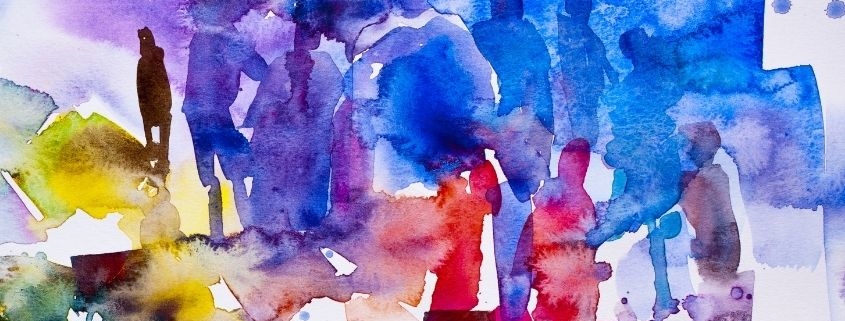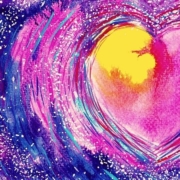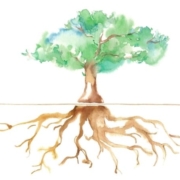Day 24: Beloved by God
BY ED SLOANE | March 12, 2021
Today’s Readings

“What do you like about being white?” Us white folks in the room shifted in our seats and looked around with uncertainty, perhaps seeking cues from the Black folks for how to respond. I was attending a weekend training on undoing racism. The conversations over the two and a half day training were often tense as people shared stories and engaged questions of how cultural and institutional forms of racism shaped our personal and collective narratives and experiences.
In today’s readings, Hosea challenges Israel to turn away from idols—those dehumanizing cultural and institutional powers that offer security for some while producing death and suffering for many. Today those idols include white supremacy, nationalism, clericalism, patriarchy, and the market. While the prophetic literature often highlights God’s righteous anger at Israel for placing faith in idols, Hosea emphasizes God’s steadfast love despite Israel’s lack of fidelity.

In the Gospel, Jesus names the love of God as a foundation for the work of justice. By extension, Jesus teaches that we should love our neighbor as ourselves. By linking love of self, love of neighbor, and love for God, Jesus calls me to refuse a self-love that is rooted in supremacy. Love of self finds its deepest expression in a desire for community and kinship that is radically inclusive—or what Jesus calls the Kingdom of God.
Self-love and self-acceptance do not mean that I must always remain the person I was before. An awareness of and anger toward harm caused and pain endured gives way to the joy of repentance as I struggle with personal demons, interpersonal harm, and structures of sin. I can accept these parts of myself even as I move beyond them to seek healing and conciliation*. The movement toward self-love is a movement toward kinship, community, and liberation that in turn draws me closer to God.
That weekend workshop did not make me an anti-racist. It didn’t lead me to unconditional self-acceptance. The work is ongoing. However, it did help to further a process in which I was able to see myself and others a little more clearly how God sees each of us, as beloved. So may it be for each of us this Lent.
For Reflection:
- What do you like about being you? Be specific!
- What idols prevent you from seeing yourself and others as beloved by God? How are these idols present in your life and what is your relationship to them?
- How can you move toward self-acceptance and live into the Gospel call to become an accomplice in the work of liberation this Lent?
*In their book, Unsettling Truths: The Ongoing, Dehumanizing Legacy of the Doctrine of Discovery (Downers Grove, IL: Intervarsity Press, 2019), Mark Charles (Navajo) and Soong-Chan Rah introduce the concept of “conciliation” in relation to settler colonialism. They point out that calls for “reconciliation” are inappropriate because it presumes a prior sense of community, respect, and justice between white and BIPOC people that has not existed. They introduce the language of “conciliation” as more appropriate to healing a division that is foundational to the encounter between white and BIPOC people.
Ed Sloane is originally from West Virginia. He received his Ph.D. in religious education and pastoral ministry at the Boston College School of Theology and Ministry. His writing focuses on approaches to education in faith through the lens of ecological justice and pastoral ministry with LGBTQIA+ youth. Ed is also a high school theology teacher.









I appreciated the thoughts expressed in this reflection. I especially loved the attached art, but could not find the credits. Could you tell me about this “drawing” that depicts our current situation. I love the use of color.
Hi Ellen, The image is from Shutterstock, and the artist is SuriyaPhoto. Unfortunately, the artist’s posted website is down (suriyaphoto.com), so we don’t know much about the background, but the image moved us too!
The question posed is one we strruggle with all our lives.Seeing ourselves as loved by God is one that ebbs and flows. At times His love is so close and others He seems distant. One of the issues is I love my joy, laughter, ability to think about complicated issues in math,encourage and notice good things about others, enjoy my grandchildren — how does that transform the scciety in which I live? I think, for me, it is the constant offering of these gifts to others and their acceptance of them that makes us feel/be especially loved by our God.
There is so.ething about me that I really like and that is the courage to nurture children over having a high salary position and prestige. This tendency places me as being not competitive, which leads to others comments that I am less intelligent than they. It does take a great deal of self knowledge and awareness to overcome those negative labels. I have discovered that I am able to forgive and understand what makes people think as they do.
Now, I can challenge myself to understand others and to love them with kindness. I understand the cultural pressure others are under to “succeed”and to produce great amounts of wealth that doesn’t satisfy and causes great harm to them and their beloveds.
There is something about me that I really like and that is the courage to nurture children over having a high salary position and prestige. This tendency places me as being not competitive, which leads to others comments that I am less intelligent than they. It does take a great deal of self knowledge and awareness to overcome those negative labels. I have discovered that I am able to forgive and understand what makes people think as they do.
Now, I can challenge myself to understand others and to love them with kindness. I understand the cultural pressure others are under to “succeed”and to produce great amounts of wealth that doesn’t satisfy and causes great harm to them and their beloveds.
What do I like about being white? I believe it’s that I don’t have to think about it at all. On a daily basis I am not conscious of my skin color, or that I fit into a category. I just think of myself as me, within the context of my family and my personal history. My grandparents on both side emigrated from somewhere in Eastern Europe in the early 1900’s, but I feel no connection to “the old country”. I can understand the impact both currently and historically of the prevalence of white/European culture in the United States but I don’t feel any emotional connection. My feeling of being a “typical” American is part of my white privilege.
Work of liberation is a meaningful mission.
My white privilege allows me to feel confident that if I have to call 911 help is coming.